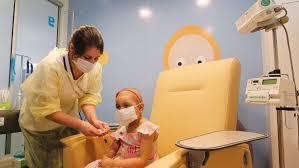
The risk of some childhood cancers might vary depending on where a child’s mother was born, a new study suggests.
For example, some brain and kidney cancers occurred less often in children whose Hispanic mothers were born outside the U.S. than in youngsters whose Hispanic or white mothers were born in the U.S., researchers found.
However, the Hispanic children had a higher risk of certain blood cancers regardless of where their mothers were born.
The researchers used California birth records of more than 4 million children of non-Hispanic white mothers, more than 2 million children of U.S. born Hispanic mothers and 4 million children of non-U.S. born Hispanic mothers from 1983 to 2011.
According to California Cancer Registry records, there were 13,999 cases of childhood cancer occurring before age six in the total group.
For certain types, like glioma and astrocytoma cancers of the brain, solid neuroblastoma tumors, and Wilms tumor of the kidney, children of non-U.S. born Hispanic mothers had the lowest risk, as reported in JAMA Pediatrics.
“We have little information on fathers who of course are important too,” said lead author Julia E. Heck of the Fielding School of Public Health at the University of California–Los Angeles.
But the marked difference in risk for some cancers based on maternal origin means that lifestyle differences may be playing an important role, Heck said.
“If there was no difference then genetics would be much more important,” she said.
In previous studies, Hispanic mothers who moved to the U.S. had better pregnancy outcomes than similar women born in the U.S.
In Mexico, for example, women generally have strong social support networks and low stress levels during pregnancy, Heck said. Also, she added, “Foreign mothers have incredibly low rates of smoking, drinking or drug use,” and smoking during pregnancy is much less common in Mexico than in the U.S.
“When Hispanic women grow up in the U.S. they take on aspects of the U.S. lifestyle,” which includes much more stress, she said.
But, there are many types of brain tumors and cancers in general, and some other types didn’t differ in risk at all, she noted.
“This is the first published study to evaluate whether cancer risk is different for children with non-US-born Hispanic mothers, so this is new information that will need to be further explored,” said Susan Carozza of Oregon State University College of Public Health and Human Sciences in Corvallis.
“Think of it as a few new puzzle pieces to fit into what has already been uncovered about cancer risk in kids,” Carozza told Reuters Health by email.
It’s difficult to estimate exactly how much risk was increased or decreased for particular cancers, since these childhood cancers are rare and there were a small number of cases to assess, she said.
At this point, neither parents nor doctors should change what they are doing based on this study, Carozza said.
“With the Zika virus threat, it would certainly seem unwise to recommend that Mexican-American women planning to get pregnant return to Mexico for their pregnancy,” she said.
Source: Reuters
 FR
FR EN
EN AR
AR








